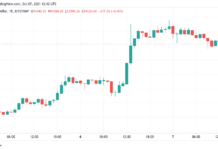In a recent conversation on SlateCast, Paul Kohlhaas, the creator of BIO Protocol, spoke with Nate Whitehill and Liam “Akiba” Wright about the potential for decentralized science and open innovation to transform the field of biotechnology. BIO Protocol aims to democratize biotech by utilizing decentralized science and DAOs (decentralized autonomous organizations) to involve patients in research and accelerate drug development with greater transparency.
Kohlhaas explained that BIO Protocol is more than just a biotech initiative; it represents a movement to embrace biotechnology and make it more open-source and accessible to everyone. Drawing parallels with the AI acceleration movement, Kohlhaas believes that biotechnology should be seen as a new “substrate for life,” comparable to how AI has become a substrate for intelligence.
One of the key innovations of BIO Protocol is the use of DAOs to connect scientists, patients, and investors in funding research that addresses specific medical challenges directly. An example of this is VitaDAO, which successfully funded research into autophagy activators, leading to the development of new drugs. Patients play a crucial role in this decentralized model, providing funds and insights that can guide research in the right direction.
A significant challenge in biotech research is the funding gap between initial discoveries and clinical trials, known as the “Valley of Death.” BIO Protocol aims to address this gap by allowing DAOs to provide the necessary funding for promising research projects. This decentralized approach not only ensures transparency but also encourages public involvement in the research process, which is a departure from traditional biotech practices.
When discussing ethical concerns in decentralized biotech research, Kohlhaas emphasized the importance of self-regulating systems that allow for open public scrutiny. Transparency and accessibility of data are crucial, especially in light of controversies surrounding COVID-19 vaccine trials. Decentralized science could prevent such secrecy by making data more available and involving the public in the development process.
Interestingly, the pharmaceutical industry has shown interest in BIO Protocol’s approach, with companies like Pfizer Ventures investing in decentralized science initiatives. Large pharmaceutical companies see the value in decentralized innovation as a way to access more creativity while reducing the risks associated with traditional biotech development. The model also allows for faster funding and development cycles, as seen in projects funded by VitaDAO that went from proposal to funded research in just three weeks.
Looking ahead, BIO Protocol envisions a future where biotech research is conducted collaboratively through DAOs, enabling communities to collectively fund projects and participate in clinical trials. This inclusive and efficient approach to drug development could revolutionize healthcare innovation by involving patients, scientists, and the public in the process.
Projects like “Pump Science,” which allows the public to bet on live experiments in animal models, aim to accelerate the pace of experimentation and engage the public in scientific research. With growing interest from both the scientific and pharmaceutical communities, decentralized science holds great promise in shaping the future of biotechnology and healthcare innovation.














